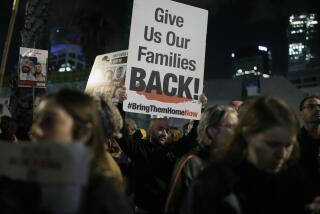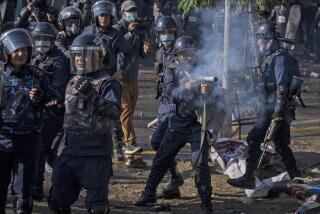Strike Shuts Kashmir City; 4 Hostages’ Fate Uncertain
- Share via
SRINAGAR, India — As the lives of four Western hostages held by Islamic guerrillas hung in the balance, Kashmiri Muslims on Tuesday demonstrated their massive opposition to Indian rule, shutting down the state’s summer capital as the rest of the country marked Indian independence day.
“The bandh [strike] is total throughout the valley,” a government official in Srinagar said. “All major district headquarters are closed. Transports are off.”
Along placid Dal Lake, in the heart of this capital of more than 570,000 people, Indian army troops and paramilitary forces greatly outnumbered strolling civilians and anglers. Shops had their metal shutters pulled down and only a few taxis drove through the streets. A flag-raising ceremony led by Gov. K. V. Krishna Rao at Bakhshi Stadium during the morning was chiefly attended by Indian government officials and army and police.
Indian officials, meanwhile, said there had been no wavering in the government’s refusal to grant the demands of the shadowy Al Faran group, which abducted six Western tourists in mountainous southeastern Kashmir last month.
On Sunday, the body of one of the kidnaped trekkers, Hans Christian Ostro, 27, of Norway, was found beheaded near a village. A note left with Ostro’s body threatened the other captives, including Donald Hutchings, 42, of Spokane, Wash., with the same fate unless India freed 15 jailed Kashmiri separatists within two days.
“There’s no ambiguity. India’s stand has been clear since the beginning of the crisis: no release of the militants,” the government official said. “There’s no change in position.”
Because the exact time that Ostro was slain is not yet known and two conflicting translations of Al Faran’s note in Urdu were issued by authorities, it was unclear when the deadline expires.
Two of the guerrillas’ remaining four captives are British; the third is from Germany. John Childs, 41, of Simsbury, Conn., managed to escape from his captors July 8.
In New Delhi, India’s capital, Prime Minister P. V. Narasimha Rao used the traditional Independence Day address to blame neighboring Pakistan for Ostro’s murder and the unrest in Kashmir, and to reject the calls of Kashmiri separatists. “Pakistan continues to export terrorism into India, and the latest example is Sunday’s incident,” Rao told a large crowd gathered at the Red Fort, the site where Indian independence was proclaimed Aug. 15, 1947.
The state of Jammu and Kashmir, where an anti-Indian insurrection has raged since 1990, claiming about 20,000 lives, “is an integral part of India, and nobody can snatch it away from us,” said Rao, who is unrelated to Kashmir’s governor.
One day earlier, Prime Minister Benazir Bhutto of Pakistan, marking her country’s anniversary of freedom from British rule, condemned Ostro’s beheading as “terrorism” and appealed for the release of the other hostages. Pakistan has denied any link with the abductions.
Al Faran is widely believed by Kashmiris and Indian authorities alike to be a front for the Pakistan-based Harkat ul-Ansar, an Islamic guerrilla group made up chiefly of Afghans and Pakistanis.
The brutality of Ostro’s murder has shocked many Kashmiris, and the All-Party Hurriyat Conference, an umbrella group of separatist organizations, called for another general strike for today to protest the killing and demand the release of the other hostages.
Police in Srinagar believe that the Westerners may now be in captivity in the hills of Doda district, about 40 miles from where they were abducted. Mounting a commando raid to free them would be fraught with peril, police said.
Kashmir is India’s only state where Muslims are in the majority, and on Monday, Pakistan’s independence day, green-and-white Pakistani flags were displayed in Srinagar and throughout the Vale of Kashmir by Kashmiris who seek unification with Pakistan.
Other Kashmiri Muslims, perhaps a majority, want outright independence for the former Himalayan principality.
More to Read
Sign up for Essential California
The most important California stories and recommendations in your inbox every morning.
You may occasionally receive promotional content from the Los Angeles Times.










